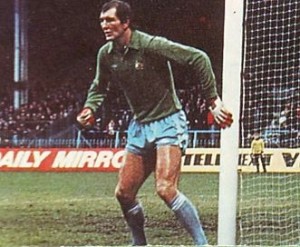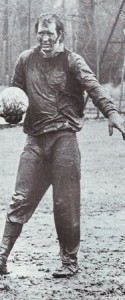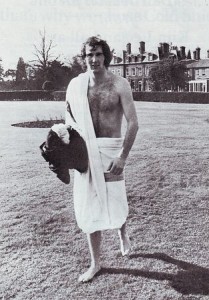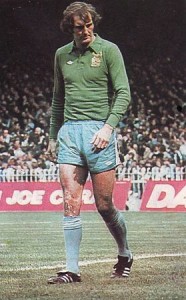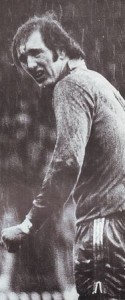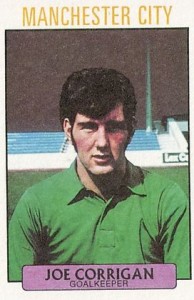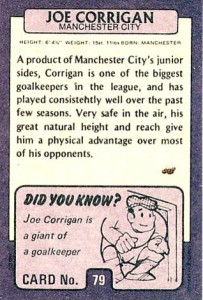
Let’s start with your school days. I believe you went to a rugby playing school?
I went to Sale Grammar School and there was no football at all. I played rugby union for the school and for Cheshire, and I guess that helped my ball control, catching ability etc. Despite this, I always wanted to be a ‘keeper and I played football at any opportunity really. When I started as an apprentice at AEI in Trafford Park the chance came to play for the works side and I played at centre-half. I had no choice about that, I wanted to play ‘keeper. I guess my size made me a defender.
Then one day I had to go in nets at half time and I suppose I must have looked all right because I was encouraged to go for a trial. Both City and United were contacted, and a reply came from Maine Road within a fortnight. After the trial Harry Godwin, City’s Chief Scout, asked me to sign and I joined a youth set up that included Tommy Booth and Ray Hatton, Boxer Ricky Hatton’s dad. United offered me a trial as well, but once City showed the interest they did I turned them down. I wanted to be loyal and City had faith in me. That mattered a great deal.
You mentioned you’d always wanted to be a ‘keeper, who were your early heroes?
There were two, Harry Gregg and Bert Trautmann. I was fortunate enough to go on loan to Shrewsbury when Gregg was there and he taught me so much. He really helped.
Trautmann of course was a phenomenal ‘keeper and a wonderful man. Being a City legend he was the type of ‘keeper I aspired to. He offered me good advice as well. I remember one day after West Ham had beaten us 5-1, it was Jimmy Greaves debut (21/3/70), I felt awful. lt was my first proper season and I felt I’d ruined my chance. This was the game when my clearance went straight to Ronnie Boyce and he sent it straight back over my head. When something like that happens, being a goalkeeper is the Ioneliest job in the world. Anyway, I was told Bert was at the game. He took me to one side and told me not to worry about the result or that goal. He pointed out these things can happen to any ‘keeper and he’d had some awful individual moments. I felt much better after that and, I guess, because he had said it, it meant more than if the manager or anyone else had said it.
One of my strongest early City memories is of you watching Bert play in Johnny Hart’s testimonial in 1974. How did that feel?
Bert was such a great player I thought it’d be good to crouch on the touchline and just watch. Even at that age, he must have been 51, he was fit and agile and someone you could learn from. The only problem was that I had to tell him he was coming off! I went over to him and a bloke in the stand shouted, “leave him in, he’s still better than you!”
Thinking about your early City days, you made a couple of League Cup appearances in 1967/8 and then 1969/70 saw your League debut. You had 34 League outings and also played in the ECWC Cup run. Did winning the ECWC make you feel as if you’d ‘made it’ as a player?
Never! I never felt that. Even when I was playing for England I didn’t take anything for granted. Playing in the ECWC final was awesome. It was a terribly wet night and the crowd was low, but that didn’t detract from the importance at all. To play in such a great side and at that level is a tremendous feeling but you have to keep your feet on the ground. I’m glad I did, because it wasn’t long before it looked as if my City career was over.
You remained first choice for most of the period up to the signing of Keith MacRae in October 1973, did his arrival feel like the end for you?
Definitely! They paid an incredible amount, I think it was a world record fee for a ‘keeper, so you know that he has to be first choice. You don’t pay that and leave him in the reserves. Plus he was a great ‘keeper. No question. I was on my way out and this was a very difficult time. The Club was also going through a few managerial changes, so it wasn’t easy. Then in 1975 Keith was injured. shortly before the transfer deadline. I thought I’d get back in, but I bought the Evening News and saw photos and names of a whole host of ‘keepers City were supposed to be interested in. It seemed to me at the time anybody but Corrigan would do. It was a tormenting time. I couldn’t bear it. Every night it was the same. Fortunately for me transfer day came and went and no one was bought. I don’t know if time ran out or what, but I know I was relieved.
You got back into the side and retained your place when MacRae was fit. What was the turning point?
l’d been working hard when I was in the Reserves. I’d tried to develop and I was determined not to lose whatever opportunity came my way. Having said that, we had mixed results and I was worried. Then we played at Wolves and they were all over us. I remember Derek Dougan and John Richards both came up for a cross and I was whacked. The ball ended up in the net and I felt awful. Then the ref blew for a foul on me and from that moment the luck was on my side. I truly believe a lot of football is about luck and opportunity and that day everything switched in my favour. We beat Chelsea and Burnley in the weeks that followed and I only missed one League game in the following five seasons.
You became a major hero over those seasons, how do you think the fans treated you throughout your City career?
There were two definite spells. The early years when received a lot of criticism, I accept that because if you pay your money you are entitled to say what you think, but it was difficult to take at times. Then there were the later years when I had matured and developed, and the fans gave me incredible support. I loved going to events like the Junior Blues and meeting real fans. I think we had it drummed into us when we first arrived at the Club by Joe Mercer that supporters are the most important people, they pay your wages and you must never forget that! Once the Junior Blues were created it was stressed how these children would in the future pay your wages. They are not simply here for a party, they are here because you are an important part of their lives. Every player should always make the effort. I had it drummed into me by Mercer that you should visit hospitals and kids homes and the like.
Actually, when I was playing in the States at Seattle a local policeman was shot. I was appalled and told the team I was going to see him in hospital. They all thought I was out of my mind. “Why do it? What is he to you?” I went to see him, invited him to a game, and he loved it, but I was stunned to find that I made the news. The headlines read “Do Gooder Joe Corrigan”, they made out I was a saint, but all I was doing was the PR that was the norm at City.
Thinking of fans, Helen Turner (the lady with the bell) must hold special memories for you?
She always sat behind me in the North Stand and before every game she would give me a sprig of heather for good luck. At away games she wasn’t always near me, so sometimes it was difficult for her to get the heather to me. If I hadn’t received it by kick off time I’d be worried. Partly I’d wonder if she was all right, but I also used to worry about my luck. If ever we lost and I’d not seen Helen I’d believe that was the reason. She’s a marvellous, devoted fan, and I know she’s done a tremendous amount of work for good causes.
Let’s talk about England. You were unfortunate to play when there were so many great English ‘keepers. Do you ever wish you’d played at another time?
No. I enjoyed playing when I did. It was good there were so many great ‘keepers around because that pushed you more. Sadly, for me it meant l’d have to try and reach a level above Shilton, Clemence, Parkes and Rimmer. It I’d been an outfield player, it may have been easier but with a goalie there is only one place to fill. When I did play for England it meant more than anything else, playing for the national side is the highest honour you can have. One of my favourite performances was when I played against Brazil, the best team in the world at the time by a long way, and we managed a 1-1 draw. I was under pressure the whole time and remember a couple of saves I am particularly proud of.
Your career spanned several managerial reigns, is there one manager who stands out as the best for you?
Because the goaIkeeper’s role is so specialised, I gained most from other goalies such as Trautmann and Gregg, but Joe Mercer was the greatest City manager of all time. He was such a warm, nice man. He knew how to tell you off as well, of course, but his enthusiasm and love of football was clear. Malcolm Allison, as coach, was tremendous. He was doing stuff in 1969 that coaches are only just introducing now and often they claim it’s a new idea! He tried to make sure the ‘keepers received their own coaching and specialist time, and when Tony Book became manager he tried to ensure this developed further. Coaches Bill Taylor and Ian McFarlane worked hard with me and I used to come in on the morning of a game to do additional training. The view was that I would get used to the actual conditions of the day and this definitely worked. If we were playing away I’d train in the hotel grounds, or in a park. On the morning of the 1981 FA Cup final I was training in a public park.
Thinking of the ‘81 final, one of my key memories is of you immediately going over to Tommy Hutchison when he scored the own goal. You lifted him up, patted him on the back and whispered something to him. What encouragement did you give?
My view was we still had a few minutes left. We’d been on top for most of the game. We could still win. So I just told him to “get up, get on with lt. It’s only 1-1 and we are still going to win!” He was devastated to be fair, but we did almost win it in the dying minutes. Personally, I believe the game should have been played to a conclusion on that day. The FA Cup is all about the Saturday and I know we would have won had it gone to a conclusion. I never liked facing penalties, I think I only saved two, but we’d have won. No question. The Saturday was our day, after that it all switched. Tottenham had no travelling to do; their fans could buy tickets from either Spurs or directly from WembIey’s allocation; and our fans were simply outnumbered in the replay even though we were by far a better supported team.
Despite our eventual defeat, you were made ‘Man of the FinaI’ for your performance. That must have felt good.
Obviously, it does mean a lot to me, but l’d rather have won the final. After the second match I was presented with it by the Spurs manager Keith Burkinshaw. I remember thanking him and saying something like “Good luck in Europe next season” and at that moment it hit home what had happened. I suddenly realised we’d lost and we wouIdn’t be playing in Europe. I was devastated. It was an awful feeling. I missed out in another way as England were playing Brazil at Wembley on the Wednesday after the final and, although there was nothing official, I understand I was due to play, but the replay the following night meant I couldn’t play.
Eventually you left City. First for Seattle Sounders and later for Brighton, why did you move on’?
I think I should have left a little earlier. I love City but it got to the stage where I knew I wasn’t really wanted here. The fans were marvellous; the players were great; but maybe it wasn’t really my time any more. I was approached by Spurs, shortly after the Cup Final, and then Liverpool after we’d beat them 3-1 (Boxing Day 1981) but both moves were blocked, so that made it clear someone still wanted me, but when Seattle made their approach in 1983 I was told I could go.
Something had changed. At Seattle I had a great time and the pressures were completely different. Sadly, City were relegated while I was away and I felt awful. It really hit me. I know I wouldn’t have changed things, Alex Williams did an excellent job, but I felt the same pain as if I’d still been there. I worried about the fans. Funnily enough when I was in the States I played a game at New York and I wasn’t happy with our performance and tactics and I shouted a bit of abuse at the bench. My own supporters started booing me and telling me I shouIdn’t swear at a football match, in my early days at City I was given abuse for being too quiet! It was all so different.
You eventually moved into coaching, something you still do. Presumably, you enjoy putting something back in to the game.
That day when Bert Trautmann came to offer advice and reassure me in 1969 meant so much to me that I guess I’ve always felt I should do the same. Bert and the other ‘keepers taught me more than coaches because they’d been there. They’d experience what I was experiencing, and I feel I need to do the same. I’ve coached all over the UK and, at one point, I was flying to Scotland, driving to Yorkshire and the north-east the next day, every day I was on the road. Then I had ten very enjoyable years at Liverpool, and now there’s Stockport and Chester as well. It’s great to put something back.
Finally, you were one of the inaugural entrants in to City’s Hall Of Fame. You received the 3rd highest number of votes after Trautmann and then Bell. How does it feel to still be remembered by fans in this way?
The Hall of Fame is such a wonderful honour. On the night I had no idea. I was interviewed by T/ and thought I was making up the numbers but then I was the first one up. I was choked, truly choked, and couldn’t get the right words into my head. Can I take this opportunity to pass on my thoughts to Norah Mercer, Joe Mercer was a fantastic man and he made such a big impression on me when I was first starting out. Also, I’d like to thank all the players who have worked with me, and of course the supporters. I was deeply touched by the award.

INTERVIEWED BY GARY JAMES IN THE CITY PROGRAMME 27TH NOVEMBER 2004



